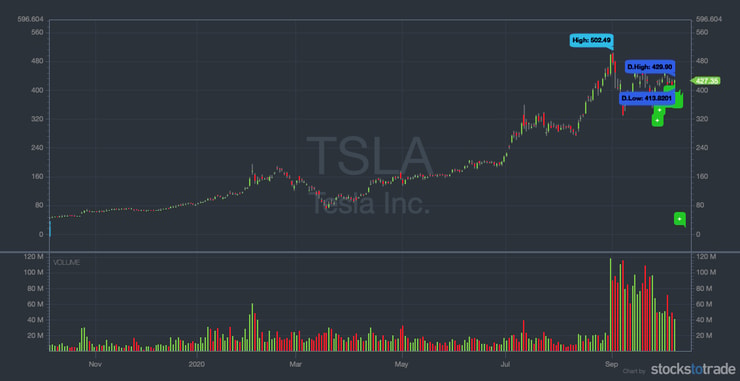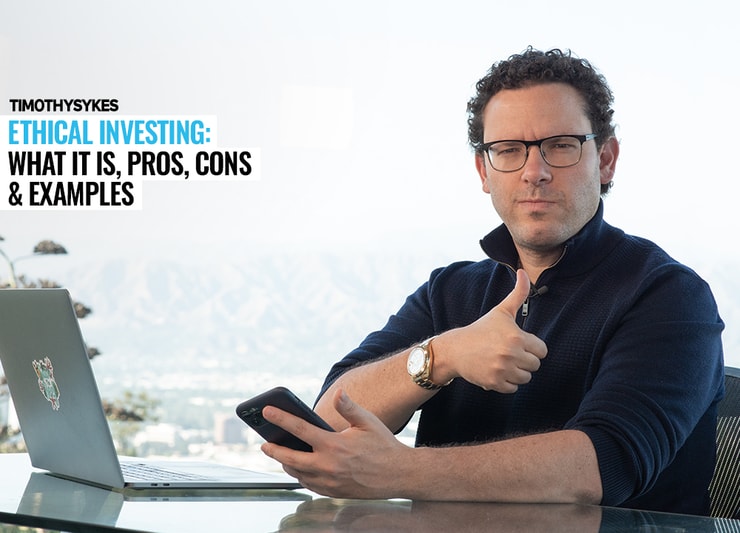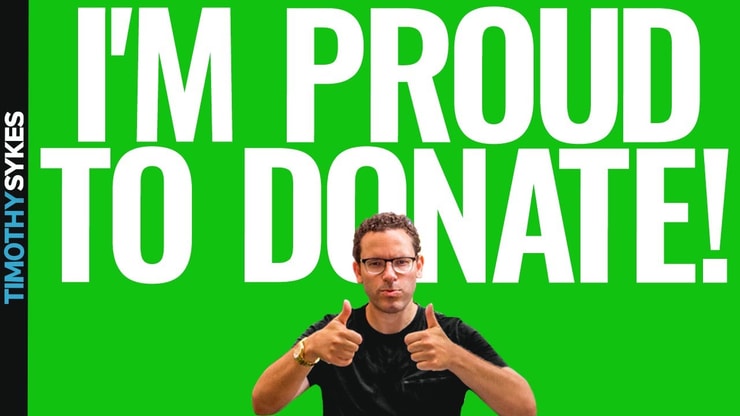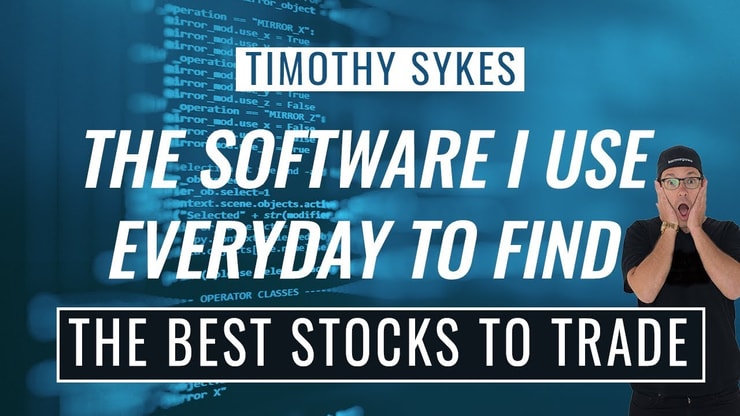Ethical investing has a pretty obvious definition — it’s investing according to your values.
This style of investing is highly individual. Is investing in electric vehicle companies ethical? Maybe, depending on how you feel about clean energy. (It’s been a hot trading sector in 2020).
The point is that this style of investing puts ethics on a par with profit.
I became a teacher to help people like you learn about the stock market. I’m not an investor — I’m a trader. But whatever route you choose, I want you to understand the basics of the market.
(And if you’re a true beginner, you need to study up before you start trading! I had no mentor, but I can be yours. Apply to my Trading Challenge if you’re ready to learn.)
I trade penny stocks most of the time, but I learn as much as I can about every strategy. Keep reading to learn some fundamentals of ethical investing.
(Disclaimer: I’m not an investor and I’m in no way giving you financial advice. All trading and investing is risky. Never risk more than you can afford. Do your due diligence.)
Table of Contents
- 1 What Is Ethical Investing?
- 2 What Are the Types of SRI Funds?
- 3 Advantages of Ethical Investing
- 4 Disadvantages of Ethical Investing
- 5 Do Ethical Funds Underperform?
- 6 2 Examples of Ethical Investments
- 7 How Do You Know if a Company Is Ethical?
- 8 How Do You Create an Ethical Investment?
- 9 The Best Apps for Ethical Investing
- 10 What Is One of the Best Ethical Investments?
- 11 Socially Responsible Investing: Why Should You Care?
- 12 Conclusion: Can You Make Money with Ethical Investing?
What Is Ethical Investing?

Ethical investing is investing in companies based on moral values. These values can be political, social, religious, moral, and so on. These values then become a deciding factor in buying stock shares.
This type of investing has only become popular in the past few years. Until the internet came along, ethical investment was a solo pursuit. Ethical investors had to do all of their research on their own back then … Now there are value-themed funds that help make it easy.
I always recommend you do your own research. If you’re familiar with my trading style, you know I don’t want you to follow alerts. I want you to become a self-sufficient trader. I want you to learn to trade on your own.
Learn from my process every week. Sign up to get my no-cost weekly watchlist and discover the stocks I’m watching.
Is Ethical Investing Possible?
All types of investing and trading are possible. It’s up to you to find your niche.
If ethical investing is your thing, then do it. It’s as simple as that. You can make anything work. You just have to learn more about it than the next trader … who, by the way, wants you to lose your trades so they can win.
What Are the Types of SRI Funds?

SRI stands for socially responsible investing. One method of ethical investing is through SRI funds.
What are SRI funds? ‘Ethical practices’ is a broad term, but it’s one way to potentially approach investing ethically. In theory, you get to choose what’s important to you when it comes to the market.
Let’s look at a few types of SRI funds…
Socially Responsible Investing Funds
Socially responsible investing funds usually focus on avoiding companies in certain industries.
SRI funds can avoid stocks that deal with gambling, smoking, alcohol, or other vices. Or they can target other stay-aways. But they don’t have too fine a focus on the companies in which they choose to invest.
More Breaking News
- DaVita’s Q4 Earnings Triumph Sparks Market Interest
- Grab Holdings Limited Faces Competitive Pressures as Market Dynamics Shift
- TeraWulf Expands Infrastructure Portfolio with Key Acquisitions and Joint Ventures
- Microsoft Stock Plummets Amid Legal Troubles and Investor Disappointment
Impact Funds
Impact funds are a category of environmental, social, and governance (ESG) funds. ESG funds look at the practices of the companies they invest in. It’s not enough just to be operating in an ‘ethical’ industry.
Impact funds are a type of ESG fund that places equal importance on investment returns.
Faith-Based Funds
Another type of SRI fund is a faith-based fund. Faith-based funds get their ethical compass from the religion they’re associated with.
These funds usually steer clear of any companies that don’t hold their beliefs and can be more restrictive.
Trading for Charity
This is another system of ethical investing. Actually, it’s the one I practice.
I’m not too worried about what a company does because I trade the sketchiest stocks out there. And I have my own way of caring for the environment … I donate all my trading profits to charity.
Ever since I became a teacher, I’ve focused more on helping my students learn than how much money I can make. My trading now is more about the process so I can teach by example.
Every year I start with a little over $12,000 in my trading account. Any trading profits I make, I donate to charity.* I like to think of this as ethical trading because it ultimately supports a good cause. And I get to be more selective with who and what I support.
Karmagawa, the charity I helped found, has donated over $5 million to 60 charities around the world. We help provide food, medicine, and education while working to cut plastic waste.
I’m not saying all this to pat myself on the back, but you should know the good you can do when you make money. Values aren’t just important for building your trading plan — they should be a part of your life.
For me, the amazing thing isn’t just inspiring traders to become self-sufficient in the markets, it’s seeing them pay it forward, too. It’s another reason I’m proud to keep it real in an industry of fakes.
New to penny stocks? Start your education with my free online guide here.
Advantages of Ethical Investing

No matter what your niche is, you’ll find pros and cons. You need to weigh the advantages and disadvantages of ethical investing if you decide it’s your thing.
Here are some potential advantages…
No Shame
The biggest draw of investing ethically is that you (probably) won’t feel shame for where your money’s going.
Regret’s not a good feeling. I’ve been there…
Moment of truth — the biggest loss of my career was $500K. You can read more about it and, hopefully, learn a few key trading lessons. It’s all in my no-cost book “An American Hedge Fund.”
Learn from my experience. Don’t put yourself in a position like that! Think about what kind of investing and trading would make you feel proud.
Your Support Could Help Ethical Companies
When you buy stock in a company, you give them a tangible form of support. You’re showing the market that you think its practices could pay off in the future.
But before you buy in, do your research. Check its balance sheets, SEC filings, news releases … You don’t want to end up throwing good money after bad.
Disadvantages of Ethical Investing

In my opinion, the biggest disadvantage is missing out on potential gains. Think about it. People come to the stock market to make money.
If you’re biased toward certain companies you might miss opportunities. Your focus could be too narrow. You could end up…
Missing a Hot Sector Run
In my niche, I trade volatile penny stocks. Most volatility — and opportunity — comes when there’s a hot sector.
Hot sectors change all the time. When I started trading about 20 years ago, the hot sector was dot-coms. All a company had to do was add ‘dot com’ to their profile to generate huge upsides.
In 2020, we saw a ton of hot sectors — coronavirus, EVs, food delivery, and more. The pandemic caused a lot of changes. But you could miss out if something didn’t align with your ethics.
Or in 2019, weed stocks ran like crazy. Some SRI investors avoid weed stocks. I’m not saying that’s right or wrong. I’m just saying that there was a missed opportunity because they steered clear of weed stocks.
Missing out on some of the biggest upsides of the year isn’t fun. But end of day, it’s up to you. And remember…
Every Company Claims to Be Ethical
The SRI funds I mentioned earlier may not always be what they seem. Some companies claim to be ethical. But many compromise values if push comes to shove.
Since this can happen often, researching these companies is a big priority.
This isn’t a bad thing. Spending time studying is crucial. All of my top students spent countless hours studying to find consistency and learn to adapt to changing markets. This is something I emphasize in my Trading Challenge, along with patterns, strategies, trading rules, and much more.
Do Ethical Funds Underperform?
This is an important question. But I think it has an easy answer.
Most ethical funds track similar to the S&P 500. That’s because a lot of the S&P 500 stocks are found in ethical funds.
At the end of the day, it depends more on what stocks are in each fund rather than whether the fund is ethical. And these well-established stocks don’t often make the kind of moves I’ve built my trading career on.
2 Examples of Ethical Investments
I gotta say it again. These are just examples, not investing advice. Talk to a financial advisor for that kind of thing.
Vanguard FTSE Social Index (VFTSX)
This fund contains mid-cap and large-cap stocks. They’ve all been screened in some way to show they’re socially responsible. Do your research!
Walden Equity (WSEFX)
This fund avoids tobacco, alcohol, animal testing, nuclear power, gambling, and weapons stocks. And it seeks out stocks that are focused on the environment, human rights, and other issues.
How Do You Know if a Company Is Ethical?

This requires some time and dedication. If you want to know if a company is ethical you need to do your research.
Start with the brand’s policy page. Good companies don’t tend to hide things. And companies motivated by their ethics usually love to tell you what they’re doing right.
But never assume a company is telling the truth. With penny stocks especially, I expect the worst so I’m never disappointed.
How Do You Create an Ethical Investment?

Again, I’m not an investor. And I know I’ve said it a lot, but I’m going to keep saying it. Do your research. Study. And no, looking up ‘ethical investing’ on Reddit doesn’t count.
Some of my top students started by studying over 10 hours per day. They each built a knowledge base. Now it only takes them a few hours per day to do their scans and build their watchlists.
Certain things make research easier and more effective. Like joining the community of motivated traders in my Trading Challenge.
Our chat room is amazing. It has helped many traders become self-sufficient. Apply to join us today.
The Best Apps for Ethical Investing

The market is a battlefield. Without the proper equipment, you can get destroyed.
I use StocksToTrade for my stock screening needs. This is the best platform for the stocks I trade (makes sense since I helped design it and am an investor in it).
But ethical investors could have different needs besides tracking the biggest percentage gainers. Here are a few apps to consider…
SoFi Invest
SoFi Invest is a well-rated platform with a ‘Doing Good’ collection. This collection is specifically designed for SRI stocks and ETFs. It’s a decent option for beginners, with a low minimum investment and zero management fees.
M1 Finance
This is another good option, with an easy-to-use interface. They also have special collections for socially conscious investors. They call these collections ‘pies,’ filled with ‘slices’ of tasty stocks.
What Is One of the Best Ethical Investments?

This is a highly personal decision. One stock might appeal to religiously-motivated investors. Another might be the right choice for the ecologically-minded.
Let me give you an example of a stock. Some could argue this stock is ethical because of its goal to eliminate gas-powered cars…
Others love to hate its CEO. What I really love is that this big stock can trade like a penny stock…
Tesla, Inc. (NASDAQ: TSLA)
Tesla designs, develops, manufactures, and sells electric vehicles. It also produces and sells energy storage systems.
You could argue it’s an ethical company because it deals with fully electric vehicles. Environmental sustainability can be a big value to traders and investors. Tesla’s product doesn’t run on oil or gas.
Tesla ran from under $400 a share to over $2,000 a share this year before doing a 5-to-1 stock split. It was a huge catalyst for the electric vehicle sector.
Here’s the one-year TSLA chart:

Look at that August-September breakout. Even though it’s a large-cap company, it acted like a penny stock on the charts. Nothing to feel bad about here … unless you were a short who got squeezed.
Socially Responsible Investing: Why Should You Care?

Like Tesla, there are other ethical investments with potentially huge upsides. It’s the best of both worlds when you support companies because of your values and make money.
Or at least that’s the way I think about it. Like I said, ethical investing is a personal decision. There are a million reasons to care … but ultimately the answer has to be your choice.
Conclusion: Can You Make Money with Ethical Investing?

I think a lot is possible in the market with a strong education and solid strategy.
But it’s gotta come from you. You have to do the work.
I’ve found my own way of being an ethical trader. It’s why I donate all of my profits to charity. I also teach to help other traders find their own way in the market.
And I think the world becomes a better place when more people find financial independence. That’s why I tell you to study and learn as much as you can.
I hope you take me up on the offer to apply for my Trading Challenge. My students build the kind of confidence in their trading to figure out what they really want from it. And that confidence helps them make smart trading decisions.
What do you think about ethical investing? Would you do it? Let me know in the comments!













Leave a reply